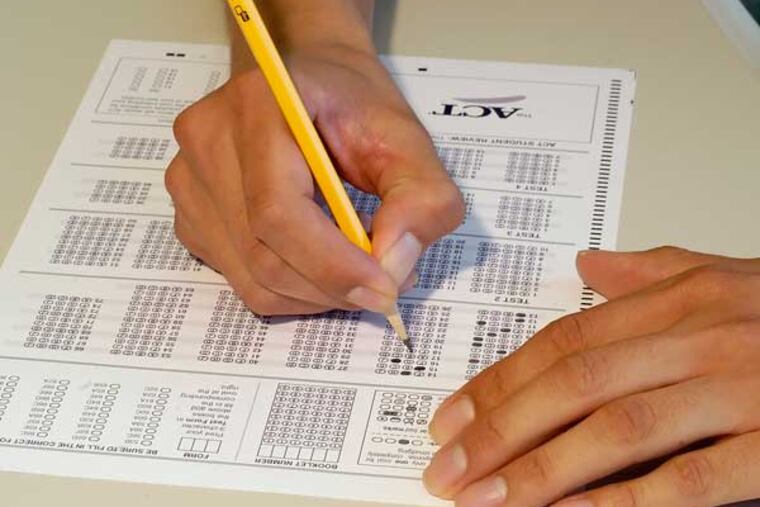A Pa. district takes stand for standard tests
An open revolt against standardized testing is spreading among some Pennsylvania school boards and administrators - but not in at least one Chester County district.

An open revolt against standardized testing is spreading among some Pennsylvania school boards and administrators - but not in at least one Chester County district.
In fact, most of the Unionville-Chadds Ford School District's board members actually like standardized tests and are enthusiastic boosters of the Keystone and Pennsylvania System of School Assessment (PSSA) tests.
One even publishes a blog extolling their virtues, says they improve performance, and criticizes their detractors.
And the district's PSSA partisans say the evidence backs their arguments.
Last week, the state released results from last year's round of testing, administered to third- through eighth-grade students under tougher Core standard guidelines for math and English. Those results generally were viewed as discouraging.
Not in Unionville.
At Pocopson Elementary School, 95.1 were graded "proficient" in English, No. 2 in the region, and 87.3 in math, No. 5. (In addition, 100 percent of Pocopson Elementary test-takers were proficient in science; that test was unchanged from the previous year.)
By contrast, statewide only 42.5 percent of students in the state scored proficient in English, and in math, 26.1 percent.
Last month, the Wall Street Journal's Street.com listed Unionville-Chadds Ford as the 15th best school district in the country. The only other local district in the top 20 was Tredyffrin-Easttown, at No. 3.
The Washington Post recently rated Unionville High School as eighth most challenging in the state, ahead of affluent Main Line rivals in Lower Merion and Radnor Townships.
"I think there's a need to figure out if our kids are learning what they're suppose to learn, so you got to have assessment in the mix, you got to have standards, and got to have consequences to that assessment," said Jeff Hellrung, a Unionville-Chadds Ford board member.
The PSSAs are used to evaluate the performances of schools and teachers as well as students.
The overall lower scores from the latest round provided additional fuel to critics who argue that test preparation is excessive and stressful.
"I happen to think that testing has gone way, way out of control," said James Scanlon, superintendent of the West Chester Area School District.
In West Chester, scores dropped an average of 24 points in math and 4 points in English, Scanlon said.
He added that he doesn't object to some testing as a snapshot of student achievement, but says the exams are given too often, and the results are overemphasized.
But Hellrung and some of his colleagues beg to differ. Hellrung said some districts are putting unnecessary stress on families. "They're almost instructing parents and kids to freak out over these tests," he said.
Hellrung said adults need to tell students, "Just relax and do your best. You're well-prepared. You're tested all the time."
Scanlon, he said, "doesn't want to be accountable. He doesn't want to be measured."
"That's his opinion," said Scanlon.
In all, 4,394 Pennsylvania pupils opted out of the math PSSA, and 4,567 skipped the English test.
But officials in Unionville-Chadds Ford believe the feedback from testing and the focus on boosting achievement is one reason the district is rated so high.
John Sanville, Unionville-Chadds Ford superintendent, stressed that the PSSAs are just one of a range of assessment tools - such as advanced placement exams or teacher-devised tests - and he said school officials don't take extraordinary measures to boost scores on the statewide exams.
"We do not conduct PSSA pep rallies; rather, we administer the tests and move on," he said. "PSSA testing should not be cause for undue angst or concern."
Bob Sage, the Unionville-Chadds Ford board member who blogs enthusiastically about standardized testing, took aim recently at the "opt out" movement. "If we 'opt out' of testing," he wrote, "then we undermine the ability of our schools to see their true level of performance, be accountable, take corrective action, and deliver an even better education to our students."
But not everyone in the district concurs.
"There is no evidence that these tests affect SATs, college enrollment, college completion, and earnings after graduation," said board member Michael Rock, who teaches economics at Bryn Mawr College.
But he said teachers will drill students on the test material for the sake of their job evaluations.
"In the end, what's that test measuring?" he asked. "Is it a real measure of educational progress - or of kids who are opportunistically taught to prepare for it?"
610-313-8232
@Kathy_Boccella